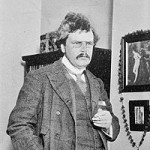A couple of months ago, I came across a Mother’s day column reprinted by the author, Maryann Miller, on her blog, It’s Not All Gravy. Though the original was printed decades ago, so much of it really rings true—and still strikes at the heart of what makes moms struggle with nobility and fulfillment in motherhood: ourselves. (The emphasis here is mine.)
While I’ve been trying to sort out all these things associated with motherhood, I keep wondering why there is so much unrest among women today, even those who have had a satisfying career outside the home before deciding to become full-time homemakers. Then I realized the unrest comes out of a loss of pride. Modern thinking has managed to strip us of any glimmer of the kind of pride our mothers could feel for their role.
It’s true that modern ideology still advocates free choice, but somehow the choice of full-time homemaker doesn’t garner the same respect and interest as choosing to be an astronaut. . . .
Under the circumstances, it’s no wonder women are in such turmoil. Society has force-fed us its version of the “modern woman” — exciting, sophisticated, fulfilled, and working outside the home. So when a woman finds her fulfillment at home, she automatically starts questioning and comparing. That is especially true of the women who had a different career first.
I found this fascinating. I often wonder if I’d had more time to “establish” my career before I had children, if I’d had those years to live for myself (and my husband) after college, if maybe I wouldn’t struggle so much to find fulfillment now.
Conversely, though, I can’t help but wonder if that time living for myself would have just made it harder to “give it all up” to become a full-time mom. I mean, I had a hard enough time giving up what little I’d had.
What do you think? Does having a career outside the home before children make it harder or easier to become a full-time mom? How does your career (former or current) interplay with your fulfillment from motherhood?
Photo by Brian Talbot
 I put Rebecca back to bed Saturday night after 10. Although she’d gone to sleep fairly quickly (after only 6 or 7 minutes of hysterical screaming) at the church during our family talent show, when we woke her to bring her home, she decided she’d rather stay awake. The two new teeth coming through don’t help. So despite repeated attempts at nursing her to sleep, she screamed for about half an hour.
I put Rebecca back to bed Saturday night after 10. Although she’d gone to sleep fairly quickly (after only 6 or 7 minutes of hysterical screaming) at the church during our family talent show, when we woke her to bring her home, she decided she’d rather stay awake. The two new teeth coming through don’t help. So despite repeated attempts at nursing her to sleep, she screamed for about half an hour. I know it’s been a while, but I haven’t forgotten about our
I know it’s been a while, but I haven’t forgotten about our 

 We’re often told raising our children isn’t enough: we should be “productive.” We should have “real jobs.” Strangers ask us to
We’re often told raising our children isn’t enough: we should be “productive.” We should have “real jobs.” Strangers ask us to  Woman is generally shut up in a house with a human being at the time when he asks all the questions that there are, and some that there aren’t. It would be odd if she retained any of the narrowness of a specialist.
Woman is generally shut up in a house with a human being at the time when he asks all the questions that there are, and some that there aren’t. It would be odd if she retained any of the narrowness of a specialist.  How can it be a large career to tell other people’s children about the Rule of Three, and a small career to tell one’s own children about the Universe? How can it be broad to be the same thing to everyone, and narrow to be everything to someone? No; a woman’s function is laborious, because it is gigantic, not because it is minute.
How can it be a large career to tell other people’s children about the Rule of Three, and a small career to tell one’s own children about the Universe? How can it be broad to be the same thing to everyone, and narrow to be everything to someone? No; a woman’s function is laborious, because it is gigantic, not because it is minute.